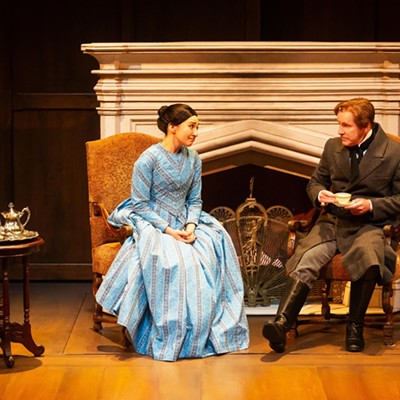Alasdair Stuart over at Sci Find recently did an amazing article that looked at Doctor Who as if the show had always featured a female Doctor throughout its history rather than the male one we have all come to know and love. It's a fantastically deep work of pop culture what if, and I highly recommend you go check it out.
It also got me thinking. The Doctor's sex is one of his defining characteristics, as Stuart points out, but his Britishness is also a major factor. If the 1996 movie showed us anything it's that very few good things happen when you get Americans too involved in Doctor Who. Hell, the only good thing about it was The Doctor himself, the very British Paul McGann.
But what if it had always been an American institution? With the 50th Anniversary so close, what would it be like to remember the the Doctor as played by...
1st Doctor - Buster Crabbe (1963 - 1966)
In the early 1960s Rod Serling had a critical success with The Twilight Zone, but the show remained always on the brink of cancellation, even going over it at times. Burnt out from the struggle of fighting for the show's survival, he decided to move on to a new project called Doctor Who about a time traveler who would fight monsters in the past, present, and future both on Earth and off. CBS reluctantly agreed to give the program a shot.
Serling convinced Buster Crabbe, the aging star of Flash Gordon and Buck Rogers, that he had one more hero in him. Crabbe agreed, and his portrayal of The Doctor as a deceptively powerful older man made him a hero grandfather to children almost instantly, as well a big hit for CBS. The First Doctor gave Crabbe the chance to show off acting chops he had never had before, and while he still threw the occasional punch and ran from the menacing Daleks, more often he thought his way out of situations and offered an occasional darker take than his youthful roles. When Serling departed the show as producer in 1966, Crabbe allowed his contract to expire as well. He died only a month after filming scenes for the show's 20th anniversary special, which was dedicated to his memory.
2nd Doctor - Paul Lynde (1966 - 1969)
Crabbe's refusal to re-sign a contract left Doctor Who with a problem. How do you have Doctor Who with no Doctor? An off-hand remark by Crabbe that a time travel might "age in reverse" upon death became a core staple of the series when he regenerated into Paul Lynde. The exuberant and swishing musical and variety show star was a stark contrast to Crabbe's more solid take, but was all the more engaging to the young audiences that made Doctor Who such a hit.
Though he was oft-times buffoonish, with little of Crabbe's poise and grace, Lynde used comedy as a mask for deeper plans... a mask that he dropped with cold determination whenever he faced the Cybermen who killed the First Doctor. He voluntarily left the role after three seasons to return to better paying and less demanding character work.
3rd Doctor - Robert Stack (1970 - 1974)
The star of The Untouchables was approached to take over for Lynde. Stack was looking to get away from crime drama, and admitted to secretly being a big fan of science fiction and bizarre phenomenon when cast. Nonetheless, his Doctor carried over many of the traits of Elliot Ness to the point that some accused him of not trying to differentiate the two very much.
The Third Doctor, while stranded on Earth following the death of The Second, was confined to a branch of the United States military as science adviser. Stack had the luck to work with Dalton Trumbo, who penned many great scripts dealing with leftover sentiments from his time blacklisted after refusing to testify to the House Un-American Activities Committee. This led to Stack facing off against Frank Sutton as The Commander, an evil high-ranking military officer who was secretly a fellow Time Lord in disguise. The social commentary against military force became a recurring theme of the series.
Stack moved on in 1974. He left behind an action-packed legacy of daring feats, and would make many allusions to his time as he hosted the series, Unsolved Mysteries.






